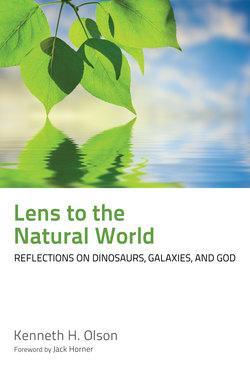Читать книгу Lens to the Natural World - Kenneth H. Olson - Страница 5
На сайте Литреса книга снята с продажи.
Foreword
ОглавлениеThis is a book about nature and how it is regarded. Lens to the Natural World is well titled, since the theme of perception runs throughout.
I am a vertebrate paleontologist specializing in dinosaurs: their evolution, anatomy, growth, and behavior. Rocks and fossils from the dim past provide windows through which we can reconstruct the history of our planet. Dinosaur fossils are also an inspiration to many young people, who may later go on to work in some branch of science.
We live in unsettled times and not just in political and economic senses. If it is true that what is honored in a culture will be cultivated there, then it is not too much to say that science does not have the honor and respect in as many segments of society as it once did and that, of late, support for it has lagged. The reasons are many. Some think of science mostly in terms of technology; they frame it largely in terms of such advances as found in new cars and computers, of faster telecommunications, better medical techniques, and so forth. There is much benefit to all of us in all those realms, but focusing on that sort of thing is a limited view.
Science is also about the quest for knowledge simply for its own sake. It is, first of all, about curiosity. It is about finding where the paths of inquiry may lead beyond pragmatic or immediate benefit. The practical application may or may not come, but the scientific questions are worthwhile nonetheless. “Why? Because I was just wondering.” All scientific endeavor of the highest order has that as its primary motivation.
There is also something of an anti-intellectual trend in our culture: the idea that every opinion is of equal worth, that “no one can tell me what to do or think” and that experts are suspect. However, in the words of Martin Luther King Jr., “Nothing is more dangerous than sincere ignorance.”
Science, like anything else, can be abused, and not all that is labeled as such belongs in that realm. It must be said quite openly that this is the case with so-called creation science promulgated by some expressions of religion.
Nearly thirty years ago, in his book In the Beginning . . ., paleontologist Chris McGowan called attention to the pressure being applied by certain groups to have their literal biblical interpretation of creation given “equal time” to that of evolutionary concepts in the public schools. His words apply now more than ever: “The problem is, though, that what the creationists are offering is not science. They are selling good old-fashioned fundamentalist religion, all spruced up with scientific terminology and ideas to look like science.” And, if you do not agree with them, you are against God, something that surprises hundreds of millions of religious people who think otherwise. As McGowan says, “What is clear from reading their literature and attending their debates is that they do not represent mainstream Christianity, and that they are as unorthodox in their theology as they are in their science.”
In great contrast, Lens to the Natural World provides a perspective of faith that is enriched by scientific exploration, celebrates wonder, and opens the door to questions on many levels.
There are now hundreds of popular books about dinosaurs. There are numerous ten-foot shelves of theology, with many of such works written by geniuses in the field. There is, however, a near vacuum in terms of books dealing with the implications of science for religion and for the rest of the humanities in a manner that is both faithful to central truths and, at the same time, directed to a wide audience. This work succeeds admirably in that complex endeavor.
Ken began his higher education in wildlife biology, before going on to philosophy and then theology. When he first told me of this writing project (probably while delivering a plaster jacket containing the latest dinosaur specimen he had discovered), he indicated that it would be “a work of science and religion and philosophy and literature.” So it is. The many literary allusions from a lifetime of reading enrich and enliven the text and speak to the imagination as well as the intellect. Read on. Enjoy.
Jack Horner
